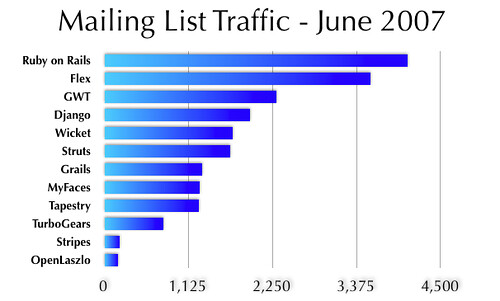Open Source Web Frameworks' Mailing List Traffic - June 2007
Who knows if these stats mean anything, but it does make a pretty graph. Current mailing list traffic leaders in the web framework space: Rails, Flex and GWT. For those frameworks with dev and users lists, these stats are from the users lists. If you find these numbers to be inaccurate, please let me know.
Here's the numbers in case you want to create your own graphs:
- Rails: 4056
- Flex: 3558
- GWT: 2305
- Django: 1951
- Wicket: 1718
- Struts: 1689
- Grails: 1307
- MyFaces: 1283
- Tapestry: 1268
- TurbyGears: 797
- Stripes: 206
- OpenLaszlo: 189



Posted by sj on July 26, 2007 at 08:43 PM MDT #
Posted by Martijn Dashorst on July 26, 2007 at 09:40 PM MDT #
Posted by kevin on July 26, 2007 at 09:49 PM MDT #
The thing I find the most interesting is Eelco's thoughts in July 2005:
;-)
Posted by Matt Raible on July 26, 2007 at 09:50 PM MDT #
I remember that quote, and still think it can be a sign of a bad framework, on the other hand, it can also mean dealing with a great community.
And on the documentation part: both Eelco and I are working on that problem (shameless plug alert!) :-)
Posted by Martijn Dashorst on July 26, 2007 at 10:45 PM MDT #
At least you start your post with a disclaimer this time ;)
FWIW, I do believe (and have experienced in fact) that if frameworks have very little traffic that that's a bad sign. It doesn't say much about the technical merrits of a project, but any project is unlikely to be perfect (or even if it is, perfectly understandable), and if there is no community to help you out, it reduces how useful it is for users. Also, if there as hardly any discussion on the lists about new features etc, it might mean a project isn't moving very fast. Though otoh it might be mature enough already, or developers might use other channels (like Wicket uses IRC a lot).
I think an even better indication is to measure how many questions are left un-answered, and incorporate activity on the bug trackers in your graphs.
Anyway, the graph does like pretty :)
Posted by Eelco Hillenius on July 26, 2007 at 11:12 PM MDT #
Posted by Sameer Tyagi on July 27, 2007 at 02:27 PM MDT #
Posted by Matt Raible on July 27, 2007 at 02:33 PM MDT #
Flex was announced that it is going open source by the end of the year: http://labs.adobe.com/wiki/index.php/Flex:Open_Source
Either way, weather its Flex/JavaFX/M$ Silverstream, I feel this is the way web apps need to go in the near future. We've pushed HTML to its limits, and adding things into the mix like AJAX can do some pretty cool things regardless of the implementing language, but that's simply a band-aid on a technology that is being used for far more then it was originally intended for. Now as developers we're simply forcing square pegs into round holes in too many situations where a rich client should have been the way to go. Instead we spend our time messing around with javascript/css/taglibs/the framework of choice's quirks/deployment descriptors and numerous other issues to simply make our apps work within multiple browsers.
Just think how nice it would be to simply place a component on a page without worrying about positioning, browser work arounds, the framework of the month or whatever. This is what I am crossing my fingers the rich app frameworks will provide. Small HTML apps have their place, but far too often I see large apps being written in HTML when obviously rich client like Flex or whatever would have made sooo much easier....
My two cents in a completely random spot. ;)
Posted by Dave on July 27, 2007 at 03:03 PM MDT #
Posted by Mike Potter on July 31, 2007 at 02:03 PM MDT #